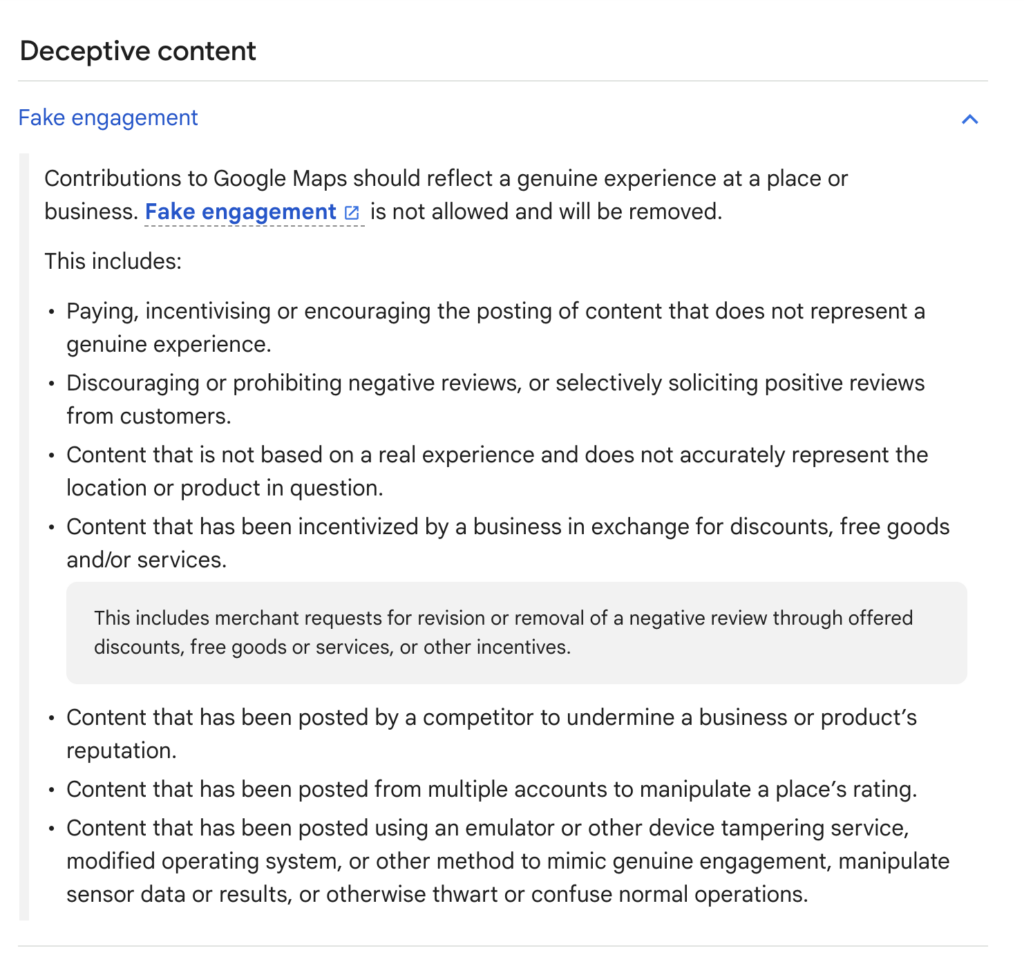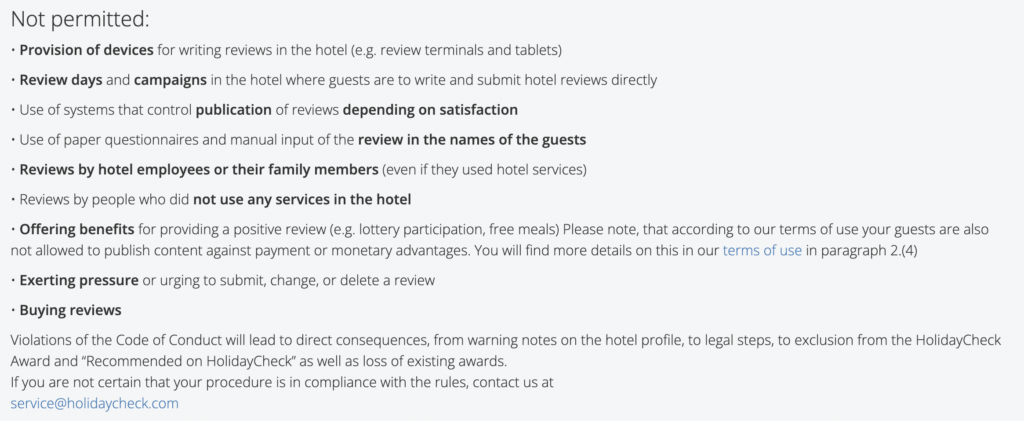Brilliant business strategy or dubious practice? In this article, we’re pulling back the curtain on review gating.
We’ll explore what it is, its implications for your business, why it’s a strategy best avoided (and the strategies you should use instead). Plus, we’ll explore the policies of the most popular review platforms to see if review gating will really get your listing banished from the web.
Let’s navigate the nuanced world of online reviews together and learn how to emerge unscathed—and ethical—on the other side.
What is review gating?
Imagine this scenario: You’ve recently engaged with a business, either purchasing a product or using a service. Eager for feedback, the company sends you a survey asking, ‘Did you have a positive experience?’
If you respond ‘yes’, they guide you to a public review site to share your positive experience. However, if you respond ‘no’, they steer you towards a private feedback form, effectively silencing any public criticism.
This tactic is known as review gating. It’s like having a selective bouncer at an exclusive club, only allowing the well-dressed guests inside while redirecting the rest to a dingy side entrance.
The outcome? A seemingly impeccable online reputation brimming with positive reviews, as negative feedback is quietly addressed behind the scenes.
While this may appear to be a clever strategy at first, maintaining a picture-perfect online reputation isn’t as straightforward or beneficial as it might seem.
The impact of review gating
When businesses play games with their online reviews, everyone ends up losing in the end. Let’s take a look at what review gating really means and how it undermines the integrity of customer feedback.
It undermines the purpose of online reviews
Online reviews are like friends telling each other what they really think about a product or service. They help customers figure out if something’s worth their money by sharing real-life experiences.
But review gating undermines this. It makes things look too good by only showing the happy customers and hiding the unhappy ones. This prevents customers from making informed decisions and can lead to feeling let down when their visit or purchase doesn’t match up with what they expected.
What’s more, reviews aren’t just for customers – they’re for businesses too. Good reviews tell you what you’re doing right, while bad reviews point out what needs fixing. By hiding bad reviews, you miss out on constructive feedback that helps you get better.
By only showing the good stuff, review gating tricks customers and stops businesses from seeing their mistakes. It changes a two-way chat into a one-sided talk. Over time, this hurts both the customer, who can’t make a smart choice, and your business, by losing the chance to learn and grow.
It puts your brand reputation at risk
A good reputation, earned from years of hard work and good service, can be a business’s best feature. But this trust is easy to lose and hard to get back, especially when you do something sneaky like review gating.
Customers want businesses to be honest and real. So if they find out you’re purposefully hiding bad feedback, they start wondering what else you’re concealing.
The problem doesn’t stop there. In today’s connected world, news travels fast. Angry customers can share their complaints on social media, blogs, or other places where everyone can see them. This can quickly change how people see your brand. Instead of great service or quality products, they might associate your brand with dishonesty.
Also, losing trust can mean losing customers. Not only might they stop buying from you, but they might also tell others to avoid your brand.
In the end, while review gating might seem like a clever way to keep your online image clean, it’s actually very risky. The damage to your reputation is much worse than the temporary benefit of hiding negative reviews.
You risk being penalised by review platforms
Let’s forget about the moral side of review gating for a bit and look at the practical problems. Review platforms are getting smarter and stricter. They’re working hard to spot and stop this kind of trickery.
Breaking these rules can lead to serious punishments. Your business could get into big trouble, like having all of your reviews deleted or even your business profile suspended.
Imagine: one day you’re enjoying lots of 5-star reviews, and the next day your account is frozen, all your reviews are gone, and you have to start from scratch. That’s a fast drop from being on top.
Remember, it’s not just about following rules. It’s about being transparent. Review platforms aren’t just places for good or bad comments; they’re trusted sources of information for customers all over the world. To keep their trust, we need to play fair.
Real-life repercussions: HolidayCheck 2023
In 2023, we were approached by a hotel association where multiple members had most, or even all, of their reviews disappear from HolidayCheck, a popular German travel booking website. It turned out that the deletions were a direct result of review gating.
The hotels in question had used a review management software that, unlike Customer Alliance, didn’t adhere to portal guidelines and ‘screened’ guests for satisfaction before inviting them to leave a review. In total, around 250 hotels were affected and over 100,000 reviews were deleted.
Along with damage to these hotels’ reputation and trustworthiness, the removal of reviews impacted their visibility on the platform and likely led to a loss of bookings.
Policies on review gating
So what exactly do review sites say about review gating? Let’s take a look at some of the most popular platforms’ policies.

The search engine giant lists review gating within its ‘Prohibited and restricted content’ policy. Falling under the category of deceptive content, it states:
« Contributions to Google Maps should reflect a genuine experience at a place or business. Fake engagement is not allowed and will be removed.
This includes…Discouraging or prohibiting negative reviews, or selectively soliciting positive reviews from customers. »
HolidayCheck

The German travel booking portal’s Code of Conduct clearly states that « Use of systems that control publication of reviews depending on satisfaction are not permitted.”
TripAdvisor

TripAdvisor’s Review Guidelines explicitly state that review gating is against their guidelines, stating:
« Review Gating. We prohibit the practice of selectively soliciting positive content and/or rejecting moderate or negative content. If any survey or external website ultimately directs users to submit a review on Tripadvisor, the user interface and experience for submitting positive and negative reviews must be identical. For example, directing a guest to one review page if they indicate a positive experience but directing them to another path (such as an internal customer support channel) if they indicate a negative experience is against our review guidelines. »
Other popular booking engines Expedia and Booking.com don’t explicitly mention their stance on review gating in their guidelines. However, they generally expect businesses to be transparent and fair when it comes to reviews.
Review gating in Europe: is it legal?
Individual company policies aside, you should also consider whether review gating could get you into legal trouble. In Europe, the legalities of review gating are governed by the General Data Protection Regulation (GDPR) and the Consumer Protection Cooperation (CPC) network.
The GDPR emphasises the right to fair and transparent processing of personal data, which includes customer reviews. Any practice that manipulates or misrepresents customer reviews, like review gating, could be seen as a violation of this principle.
Review gating isn’t explicitly mentioned in the GDPR, but the regulation’s principles of transparency and fairness can be interpreted to prohibit this practice.
Businesses are required to process personal data in a manner that is fair, transparent, and respects the rights of the data subject. If a company selectively solicits positive reviews, it could be seen as misleading and unfair.
Moreover, the CPC network, which enforces consumer laws in the European Union, has rules against misleading commercial practices. Review gating could fall under this category as it can distort the economic behaviour of consumers, leading them to make decisions they would not have made otherwise.
Companies found guilty of review gating could face severe penalties, including hefty fines. Under the GDPR, fines can reach up to 20 million euros or 4% of the company’s global annual turnover, whichever is higher. The CPC network can also impose penalties, including orders to cease the misleading practice.
What to do instead of review gating
Review gating may be off the table, but that doesn’t mean you have to leave your online reputation to chance. Here are some more ethical and effective strategies to lessen the impact of negative reviews.
Collect new reviews
Instead of trying to hide negative reviews, why not outshine them with positive ones? One bad review, when surrounded by a sea of great feedback, loses much of its sting.
Think about how reviews are presented on TripAdvisor. For each listing, the five most recent reviews show up on the first page. This gives you a great opportunity to emphasise the positive over the negative.
All you need are five new great reviews and that not-so-great one will be pushed to the second page. Easy to find if a prospective cares to look, but no longer front and centre when someone looks up your business.
However, it’s worth pushing for more. 31% of consumers read more than 10 reviews before trusting a business with their money, especially the younger demographic who tend to be more thorough in their research.
Not sure how to get new reviews, fast? We’ve got 8 methods that you can implement today to get the ball rolling.
Respond with consideration and care
The way you respond to a bad review can say a lot about your business and how much you care about your customers.
If you reply carefully to a bad review, potential customers will see a business that pays attention and cares about making customers happy. This lets them know that if they have a problem, your business will take care of it quickly and professionally.
On the other hand, if you don’t respond to bad feedback, it might worry potential customers. It could look like you don’t care about what customers think and aren’t interested in fixing problems.
In short, a well-crafted reply has the power to reverse the impact of a negative review on your business. If replying to reviews is something you struggle with, make use of review response templates or even AI tools. Not only will these tools help you craft thoughtful responses, but they can also significantly save you time and ensure consistency across your responses.
Conclusion: embrace transparency and reap the rewards
Gating reviews may seem like an alluring shortcut to a great online reputation, but the risks and potential fallout vastly outweigh any short-term gains. In the end, this strategy not only betrays your customers’ trust, but also squanders valuable opportunities for improvement.
The true path to a strong online reputation lies not in the manipulation of feedback, but in honestly and respectfully engaging with it. Encourage new reviews, respond with care to criticisms, and always strive for transparency.
The world of online reviews can be challenging, but remember: businesses that value authenticity, transparency, and customer satisfaction always come out on top. Show your commitment to these values in your review practices, and you’ll find that trust isn’t just earned—it’s returned in the form of loyal customers and a thriving business.
Updated April 2024

